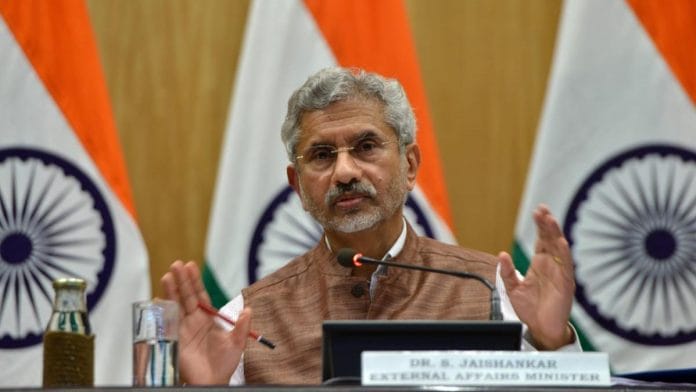New Delhi: External Affairs Minister S. Jaishankar Friday came down heavily on Pakistan over the recent controversy on whether terrorist Dawood Ibrahim is present in that country, and batted for immediate adoption of the long-pending Comprehensive Convention on International Terrorism (CCIT).
Speaking at the Darbari Seth Memorial Lecture 2020 organised by The Energy and Resources Institute, Jaishankar said there are still certain countries that continue to deny the existence of terrorism on their soil but sustained pressure from the international community is now making them accountable.
“As we have seen last week, sustained pressure through international mechanisms to prevent the movement of funds for terror groups and their front agencies can work. It has eventually compelled a state complicit in aiding, abetting, training and directing terror groups and associated criminal syndicates to grudgingly acknowledge the presence of wanted terrorists and organised crime leaders on its territory,” Jaishankar said while addressing the virtual event.
“The struggle against terror and those who aid and abet it is a work in progress,” he added.
The minister was referring to the Pakistan government’s move last week in which it released two notifications, or Statutory Regulatory Orders (SROs), giving details of the present status of 88 terrorists and their entities, including Dawood Ibrahim, Jamaat-ud-Dawa chief Hafiz Saeed and JeM leader Masood Azhar, to the United Nations.
The Imran Khan government subsequently distanced itself from acknowledging that Dawood is present in that country.
Jaishankar said it is due to a range of mechanisms such as the Financial Action Task Force, various UN Sanctions Committees and the Counter Terrorism Executive Directorate, that countries such as Pakistan are now made accountable for growth in terrorism.
“Terrorism was not born on 9/11, nor has the Covid-19 been the only pandemic… Nineteen years from the tragedy of 9/11 and 12 years from our own 26/11, we have a range of mechanisms in place to contend with terrorism,” he said.
However, he added that the world still “lacks” a global template on countering the scourge of terrorism, and reiterated India’s long-pending push for adopting the Comprehensive Convention on International Terrorism.
The adoption of CCIT under the UN was first proposed by India in 1996, but it has been in limbo ever since due to opposition from several countries on some of the provisions in the convention.
“We still lack a Comprehensive Convention on International Terrorism, with the membership of the UN still wrestling with certain foundational principles. All the while, states that have turned the production of terrorists into a primary export have attempted, by dint of bland denials, to paint themselves as victims of terror,” he said.
Also read: Pakistanis know a lot about Dawood Ibrahim. The don lives in White House, drives a black taxi
Reform of international organisations ‘imperative’
The external affairs minister also stressed on the fact that the reform of international organisations such as the United Nations and others is not just “desirable but imperative”.
“We need to modernise the international system, step by step, to make it fit for purpose, beginning by making each entity relevant to the age in which we live, not when it was created. This requires revisiting membership and structures of control, re-orienting operational principles and rules, and rebuilding the resourcing channels of the key pillars of multilateralism,” he said.
With India soon becoming a non-permanent member of the UN Security Council (UNSC), Jaishankar added, New Delhi will work with “all those who recognise the benefits of multilateralism and are prepared to contribute more to its reform”.
“For all the challenges that the current pandemic has brought to our doorsteps, it has also refocused us on the international system that has coexisted for as long as we have been a free nation. It is, in that sense, a unique moment for serious reflection on the state of the world order to which we have become accustomed,” he said.
India’s latest UNSC stint — its eighth so far — will begin from 1 January 2021 for a period of two years.
Also read: How terror exporter Pakistan has ducked sanctions. Something North Korea, Iran couldn’t do






